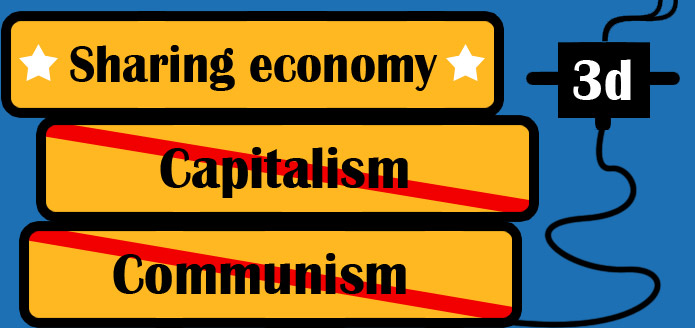The end of capitalism
The 21st century will see the end of capitalism through the takeover of sharing economy. It is, in essence, the thesis of the last essay from Jeremy Rifkin, one of the most famous humanist / futurist of our time.
For a few decades, Rifkin has regularly surprised by the foresight of its analysis and its sense of historical dialectics. In his essay, the demonstration of Rifkin is very simple: the classic capitalist economy is based on a few pillars: ownership, profit, intermediation and the separation between producer and consumer.
But new technologies are to completely transform this model from within. Today, anyone can film himself on a mobile phone and propose a project to the Internet users, let’s say building a mini solar panel with a 3D printer. And through crowdfunding, this project will become a global reality, allowing everyone to provide some of its own energy.
Which would, in classical economics, took a year of development (the time to find money from a bank, to build a business model, to file licenses, to create a sales system of intermediaries, etc.) can now be done in a few hours through collective intelligence.
This is both a structural economic change (self-production, short circuits, loss of marginal costs) and a complete transformation of our values (ecology, sharing and participation prevail over selfishness and passivity).
It is also striking to see that it is impossible to adequately analyze this transformation from traditional concepts of capitalism or marxism. This is proof that we actually shifting paradigm to achieve something new, which requires reinventing the concepts that we have used so far to understand the economy and society.
A digital Renaissance
However, the reactions to this essay are as interesting as the content of the book itself.
If Rifkin wrote such an essay 5 years ago, it is likely that no one would have paid attention to his analyzes. They would have been welcomed by specialists with a skeptical look, and the public would not have understood what he was talking about.
But now that people use Uber, sleep homestay with Airbnb and write articles on Wikipedia, it is possible to understand another way of doing things together is possible.
The fact that his essay is a worldwide success extensively reported by the media shows that the overall picture he reveals resonates with the emerging values of humanity.
This is proof that we are reaching the end of a cycle that started with the industrial revolution and was carried by the individualism and materialism, and that we are now moving towards an era centered on sharing and the collective.
Many people still resist the idea. This is not very surprising because when humanity switches from one era to another, it usually means that the values of the dying time are exacerbated before giving way to their opposite. That’s what happened at the time of the Renaissance, when humanity has experienced an extraordinary blossom.
From this point of view, the main barrier that the reader may find in Rifkin’s book is his own cynicism. We have been so conditioned to believe that capitalism and globalization have already won that it is difficult to consider any another scenario.
Weary giants of flesh and steel
But remember the figure of Yin and Yang: it is when the darkness seems to prevail that everything can change. Yet, this transformation from shadow to light will not happen by itself: it is a collective labor, and it will take everyone to make it possible.
From this point of view, what is lacking in the work of Rifkin is a deeper analysis of all the obstacles that these changes will meet, especially on the side of economic forces and traditional political powers. I find it is striking that specialists talk about Internet governance as if it were to be assumed by a central authority without ever considering the possibility that the Internet could eventually generate its own governance.
The work of Rifkin is less a prophecy than an call to action: he does not seek to foretell the future: it shows us how it is possible to combine the pieces of the puzzle to create something new and unexpected, beyond the walls where we locked oursleves.

